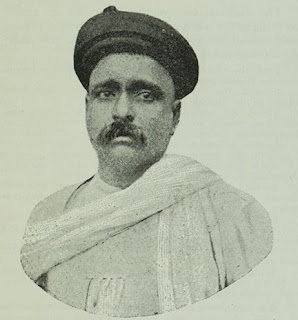Today India is celebrating the 165th birth anniversary of Bal Gangadhar Tilak, a leading light of Indian freedom struggle.
Of Bal Gangadhar Tilak, Edwin Samuel Montagu, British Secretary of State for India between 1917 and 1922, said, "Tilak is at the moment probably the most powerful man in India".
One of the famous triumvirate called “Lal-Bal-Pal”, Bal Gangadhar Tilak was born on July 23, 1856 in Ratnagiri district in the Konkan region of Maharashtra.
Bal Gangadhar Tilak was educated in Poona where had co-founded Fergusson College, a landmark educational institution in Maharashtra. A scholar in mathematics, law and Sanskrit, Tilak was one of the founders of the Deccan Education Society in 1884, with Gopal Ganesh Agarkar, Madhavrao Namjoshi and Vishnushastri Chipalunkar being the other members.
During Home Rule movement which he started in 1914 Bal Gangadhar was given the epithet of Lokamanya (Universally Respected). Tilak was called "father of Indian unrest" by Sir Ignatius Valentine Chirol, a British journalist.
Tilak was imprisoned several times by the British authorities on charges of sedition. In July 1908, he was imprisoned for six years on charges of sedition and sent to Mandalay Jail in present-day Myanmar where he wrote Gita Rahasya or Bhagavad Gita . The Arctic Home in the Vedas was also written by Tilak.
The nationalist poet Subramania Bharati translated Tilak’s Tenets of the New Party into Tamil.
Tilak had launched two newspapers, Kesari (in Marathi) and Mahratta (in English). His trenchant criticism of colonial rule through these newspapers earned him the ire of the British administration.
Tilak initiated two important festivals, Ganesh in 1893 and Shivaji in 1895.
In 1916 Tilak signed the historic Lucknow Pact also known as the Congress–League Pact.
Tilak breathed his last in Bombay on August 1, 1920. Gandhi wrote of him in Young India on August 4, 1920:
“A giant among men has fallen. The voice of the lion is hushed… He knew no religion but love of his country. He was a born democrat. He believed in the rule of majority with an intensity that fairly frightened me…No man preached the gospel of swaraj with the consistency and the insistence of Lokamanya.”
Famous Quotes from Bal Gangadhar Tilak
"Swaraj is my birthright, and I shall have it!"
'If God were to tolerate untouchability, I would not recognise Him as God at all.''

Comments
Post a Comment